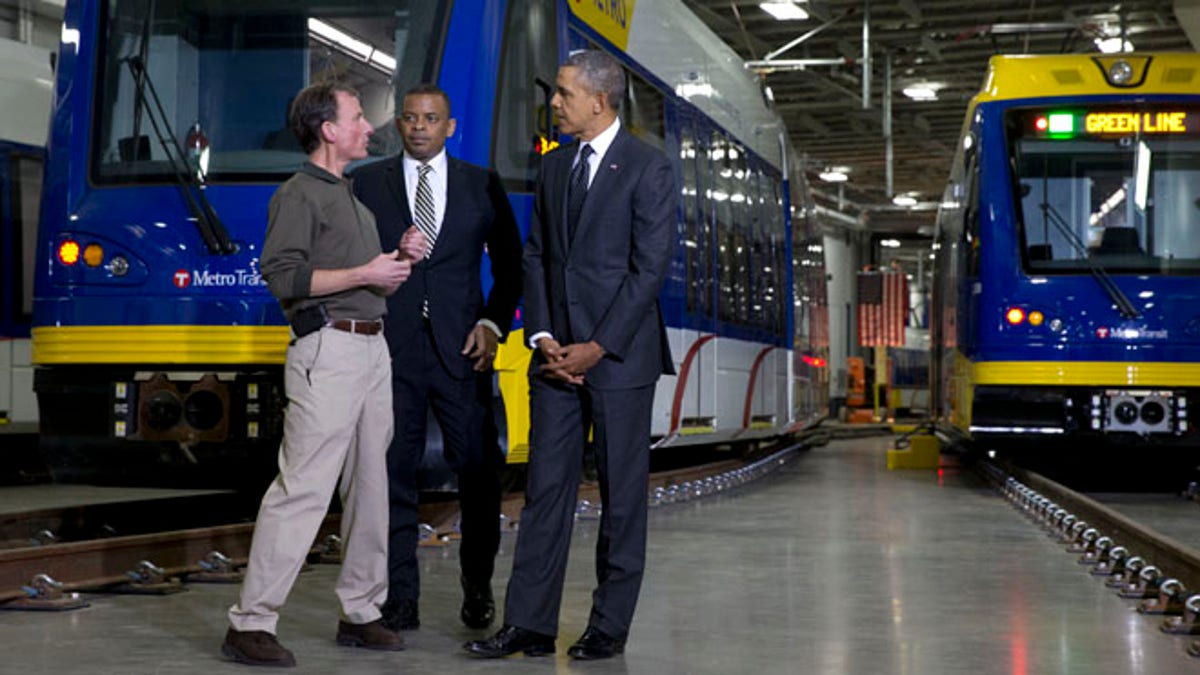
Feb. 26, 2014: Mark Fuhrmann, New Start Program Director of Metro Transit, left, talks with President Obama and Transportation Secretary Anthony Foxx, during a tour of the Metro Transit Light Rail Operations and Maintenance Facility in St. Paul, Minn. (AP)
Just two days after the Pentagon outlined major cuts to the U.S. Army and other military programs, President Obama is calling for a whopping $300 billion commitment for America's roads, bridges and mass transit systems -- though as much as half comes from a tax plan that has bleak prospects on the Hill.
The president talked about the stimulus-style plan during a stop Wednesday afternoon in St. Paul, Minn. Officials say the money, as proposed, largely would come from "pro-growth business tax reform." But aside from the challenges in pushing tax reform, Obama could have a hard time making the sell when his military leaders, just days ago, were complaining about the budget crunch.
Moments before the president took the podium, the Republican National Committee also questioned whether new transportation spending would be the jobs engine the administration claims.
"President Obama claimed that the $830 billion stimulus would spend money on shovel-ready projects that would repair our country's infrastructure," RNC spokesman Jahan Wilcox said in a statement. "If the president couldn't fix our economic problems the first time, then why would we trust him with another blank check?"
On Monday, Defense Secretary Chuck Hagel proposed shrinking the Army from its current level of 522,000 to between 440,000 and 450,000, which would be the lowest level since before the World War II build-up. He called for a range of other cuts including retiring the A-10 fleet for a savings of $3.5 billion. Military officials said they need to cut $75 billion over two years, to comply with congressionally mandated reductions.
The $302 billion infrastructure fund Obama is talking about would last for four years, but more than eclipses the budget shortfall the military is grappling with.
The administration is calling for $150 billion from tax reform changes, combined with existing funding for road projects, to fund the plan. A White House "fact sheet" said the nation's transportation system is facing a "funding crisis" -- and needs the money for everything from highway improvements to new light rail and bus projects to mass transit ventures.
The Highway Trust Fund finances federal highway and transit programs but is forecast to go broke as early as August. The fund needs $100 billion over the next six years just to maintain current spending levels. But Obama and Congress don't want to raise gas taxes to make up the gap.
Obama also is announcing a competition for $600 million in federal grants to fund infrastructure projects that create jobs.
But any call for additional funding is bound to touch off a renewed debate over spending priorities.
Lawmakers have already challenged Hagel's proposed cuts and suggested that the administration -- and Congress -- needs to start finding savings elsewhere, including from cuts to entitlement spending like Medicare and Social Security.
While $75 billion is a seemingly staggering sum for the military to confront, fiscal watchdogs have long flagged areas of the budget they say are ripe for savings. For example, Republican Sen. Tom Coburn's latest version of his annual "wastebook" claimed to have found nearly $30 billion in "wasteful and low-priority spending." This included $65 million for tourism-related TV ads in New York and New Jersey after Superstorm Sandy, as well as nearly $1 million for the National Endowment of the Humanities to study "popular romance."
There's also the question of whether Congress is willing to pursue a tax reform proposal of any kind this year. House Republicans, led by Rep. Dave Camp, R-Mich., presented a plan of their own on Wednesday. It would cut the top income tax rate and cut the corporate tax rate, but impose a new 10 percent surtax on some earned income above about $450,000. The plan actually borrowed some ideas from Obama, and included a similar plan to dedicate $126.5 billion in corporate tax revenue to the highway trust fund over eight years.
But the GOP leaders of the House and Senate have distanced themselves from the plan.
When asked whether the Republican Party stood behind the plan, House Speaker John Boehner said, "You're getting a little bit ahead of yourself."
The White House says Obama is open to other ideas to pay for the infrastructure plan and would look for private investment ideas as well.
The Associated Press contributed to this report.




